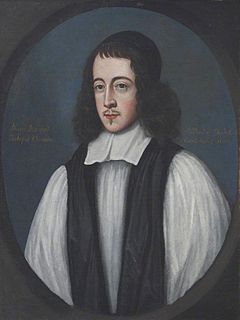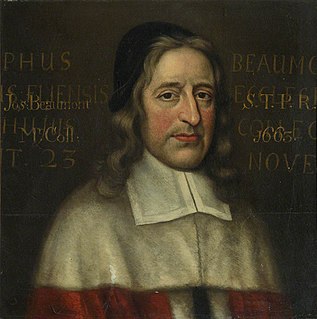Related Research Articles

Henry Bennet, 1st Earl of Arlington, KG, PC was an English statesman.
David Chillingworth is an Anglican bishop. He was Bishop of St Andrews, Dunkeld and Dunblane between 2004 and 2017, until his retirement. He was also the Primus of the Scottish Episcopal Church from 2009 to 2016.
Henry Guthrie was a 17th-century Scottish historian and cleric who rose to be Bishop of Dunkeld.
George Haliburton was a Scottish cleric and Jacobite. He was both Bishop of Aberdeen and Chancellor of King's College, Aberdeen.
George Haliburton or Halliburton or Halyburton may refer to:
Patrick Lindsay (1566–1644), bishop of Ross, archbishop of Glasgow, son of John Lindsay, and a cadet of the house of Lindsays of Edzell, Angus, was born in 1566, and studied at St Leonard's College, St Andrews, where he was laureated in 1587.
Robert Laurie or Lawrie MA (c.1606–1678) was a seventeenth-century Church of Scotland prelate. He was minister of Stirling before becoming, after the Restoration and the reinstitution of episcopal order in Scotland, Dean of Edinburgh.

Walter Blandford was an English academic and bishop.

Joseph Beaumont was an English clergyman, academic and poet.
William Paul was an English royal chaplain and bishop of Oxford.

William Nicholson was an English clergyman, a member of the Westminster Assembly and Bishop of Gloucester.

Richard Arundell, 1st Baron Arundell of Trerice of Trerice in Cornwall, was an English politician who sat in the House of Commons at various times between 1640 and 1664 when he was raised to the peerage. He fought in the Royalist army during the First English Civil War.
Patrick Torry (1763–1852) was a Scottish Anglican bishop who served as a bishop in the Scottish Episcopal Church during the first half of the 19th century.
Dundee in Forfarshire was a royal burgh that returned one commissioner to the Parliament of Scotland and to the Convention of Estates.
John Durel (1625–1683), John Durell, or Jean Durel, was a cleric from Jersey, known for his apologetical writing on behalf of the Church of England. He became Dean of Windsor in 1677.
William Row (1563–1634) was a Scottish presbyterian divine.

Greyfriars Burial Ground is an historic cemetery in Perth, Scotland, dating to 1580. It is a Category A listed structure.
References
- Clarke, Tristram, "Haliburton, George (c.1616–1665)", in the Oxford Dictionary of National Biography, Oxford University Press, 2004 , retrieved 20 Feb 2007
- ↑ Fasti Ecclesiastae Scoticana vol.7 by Hew Scott